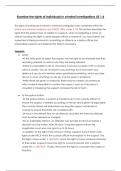Examine the rights of individuals in criminal investigations U3 1.4
The rights of individuals involved in criminal investigations are contained within the
police and criminal evidence act (PACE) 1984, under S. 24. This section describes the
rights that the police have, in relation to suspects, when investigating a crime, as
well as including the right to arrest people without a warrant if: you have been/ are
suspected of being involved in committing an offence or a police officer has
reasonable suspicion and believes the arrest is necessary.
Suspects:
● Arrest:
-At this initial point of arrest, the suspect has the right to be informed that they
are being arrested, as well as why they are being arrested.
-Unless it is impossible to do so, the police must issue a suspect with a caution,
which is usually ‘You do not have to say anything. But it may harm your
defence if you do not mention when questioned something which you later
rely on in court. Anything you do say may be given in evidence’
-While these are given to everyone, there may be certain circumstances
which make it impossible to caution the suspect, such as if the place is
crowded or if keeping the suspect increases the risk of harm.
● At the police station:
-At the police station, a suspect is handed over to the custody officers to
ensure the suspect is treated according to the law and is given his legal rights.
The custody officers will determine how long the suspect will remain in
custody to ensure time limits are complied with.
-24 hours is the default time for all offences, and after this time the offender
must be either released or charged.
-For an indictable offence, an offender can be held for 36 hours before a
decision must be made. After 36 hours, it requires approval from the
magistrates court who may grant up to 96 hours.
-In addition to the right of the amount of time, suspects have 3 other main
rights under PACE which the custody officer must explain to the suspect. The
first right comes under ‘S. 56 PACE’ and is the right to have someone informed
of their arrest. Suspects have the right to consult in private with a solicitor
under the ‘S. 58 PACE’. Finally, they have the right to consulate the Codes of
Practice.
, -Failure to adhere to one of these rights may result in evidence being
deemed inadmissible.
-For example, in the case of Sian O’callaghan who went missing in Swindon in
2011. Police arrested a suspect, Mr Hallowell, who later pleaded guilty.
Following the guilty plea, it emerged that a second murder charge against Mr
Halliwell had been dropped due to an error from police. Despite Halliwell
confessing to the murder of Becky Godden-Edwards, the evidence was ruled
inadmissable as Detective Superintendant Steve Fulcher had breached the
guidelines of the Criminal Evidence Act of 1984 by failing to caution him and
by denying him access to a solicitor during the period in which the
confessions were obtained.
● Questioning:
-Furthermore, there are rights included in the collection of evidence, which
are classified as police rights. The police have the right to collect evidence
from the suspect whilst detained in custody including both physical and
testimonial evidence.
-In terms of physical evidence, fingerprints and DNA can be collected from
the suspect with reasonable force if necessary. In regards to testimonial
evidence, anyone detained at the police station may be questioned, and
due to rights and safeguards, all interviews must be taped.
-Suspects also have rights during police interviews, with a key right being the
right to have a solicitor present. The rights of suspects are declared during the
caution, for example “you do not have to say anything” which is related to
the right to silence. However, a suspect's failure to mention something that
they may later wish to use in court, may be used against them. If a defendant
chooses to remain silent, this silence is not enough for a conviction in itself.
● Before going to court:
-Before going to court, a suspect can be released on bail meaning they will
be at liberty until the next stage of their case but the police may impose
certain restrictions upon them. The police have 28 days to investigate before
charging or releasing a suspect.
● In court:
-In court, suspects' rights must still be upheld. The inclusion of the European
Convention of Human Rights has only served to re-emphasizes the
importance of a fair trial. Article 6 of the Humans Right Act 1998 states that,
irrespective of your supposed crime, you have the right to a fair trial.




